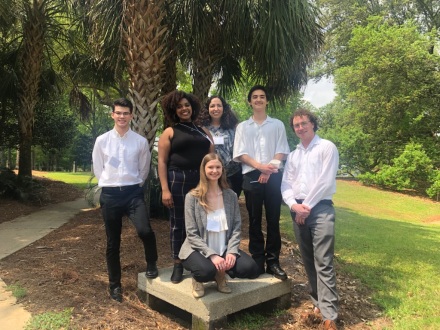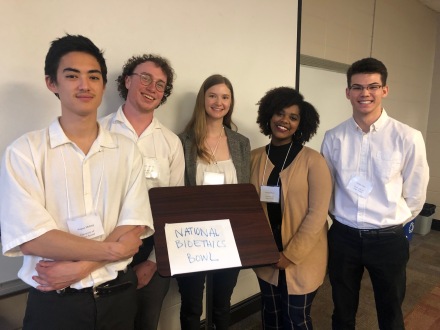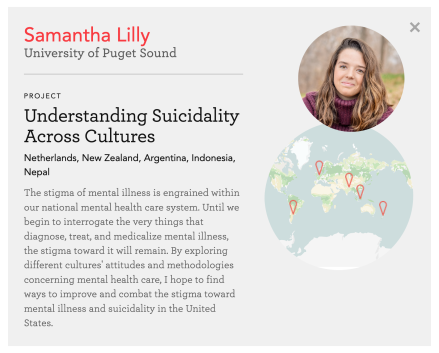On April 5–6, students on the Puget Sound Ethics Bowl and their coach, Prof. Tubert, traveled to Mobile, AL to compete in the National Bioethics Bowl at University of South Alabama.
The National Bioethics Bowl is a college-level collaborative presentation and debate about pressing ethical issues in biomedicine and technology. Months prior to the competition, each team receives a case packet containing 15 cases about bioethical dilemmas. Each team conducts research relevant to the individual cases and defend a position using ethical reasoning and argumentation. The bowl entails several rounds of debate. In each round, two teams are given time to present their position and argument for a given case they prepared. Following each presentation, teams have the opportunity to hear and respond to replies from the opposing team. Finally, the teams engage in a Q&A session with judges who included professionals in healthcare, government, and philosophy.
Some of the cases the Puget Sound team presented on were about unrepresented patients, CRISPR babies, and therapeutic misconception.
Students reflected on the value of participating in this bowl:
Liam Grantham ’20: “Debating our positions against another team made us stronger public speakers and improved our ability to act professionally (even when we strongly believe our opponents’ position is flawed)…I would definitely recommend the ethics bowl club to other people who are genuinely interested in ethics as much as we are. It sometimes takes a lot to come to a consensus on some of the cases we were given, but if you are passionate about ethics (doing the right thing), then it is absolutely worth it.”
Colleen Hanson ’19: “Bioethics bowl is … a necessary space to discuss pressing ethical dilemmas in medicine and biotechnology. There will always be a need for people to critically reflect and make decisions on these issues. Bioethics bowl integrates students and experts from various disciplines and backgrounds, providing a robust and diverse pool of perspectives. As such, I think bioethics bowl is an essential activity not only in the types of skills it develops in students, but in the purpose it serves for the greater bioethics field.”
Simone Moore ’20: “…this experience not only helped us strengthen our rhetorical skills, but challenged us to interrogate and apply the foundational philosophical information that we have gathered through our time at UPS thus far. I feel fortunate that I was able to participate in an event such as this, and I hope that I will be able to do it again…”
Holden Chen ’20: “The event was certainly competitive, but at the same time, it was one that prompted a deliberative process that goes beyond itself. We now have familiarity with these timely ethical issues and have acquired the skills and knowledge to develop strong positions, but it doesn’t just stop there for us. The very fact that we were challenged at the competition shows that there’s always more to engage with and consider. The ethical discussions don’t stop, and we as ethicist of the now and of the future have come away from the experience with more appreciation for the process.”
August Malueg ’20: “Ethics bowl has helped me develop strong public speaking skills and has made me more confident in my ability to relate my thoughts to others… In Mobile I had the opportunity to meet students from various universities that traveled to the competition (such as Depauw and Loyola Chicago), as well as locals, who were overwhelmingly hospitable and welcoming. I think it is important to keep ethics bowl active at the university and to continue offering students the chance to travel to compete because it not only helps them in the professional and social sense, but also because they have the opportunity to continue to have novel experiences abroad.”
 Top: Holden Chen ’20, Simone Moore ’20, Professor Ariela Tubert, August Malueg ’20, Liam Grantham ’20 / Bottom: Colleen Hanson ’19
Top: Holden Chen ’20, Simone Moore ’20, Professor Ariela Tubert, August Malueg ’20, Liam Grantham ’20 / Bottom: Colleen Hanson ’19









